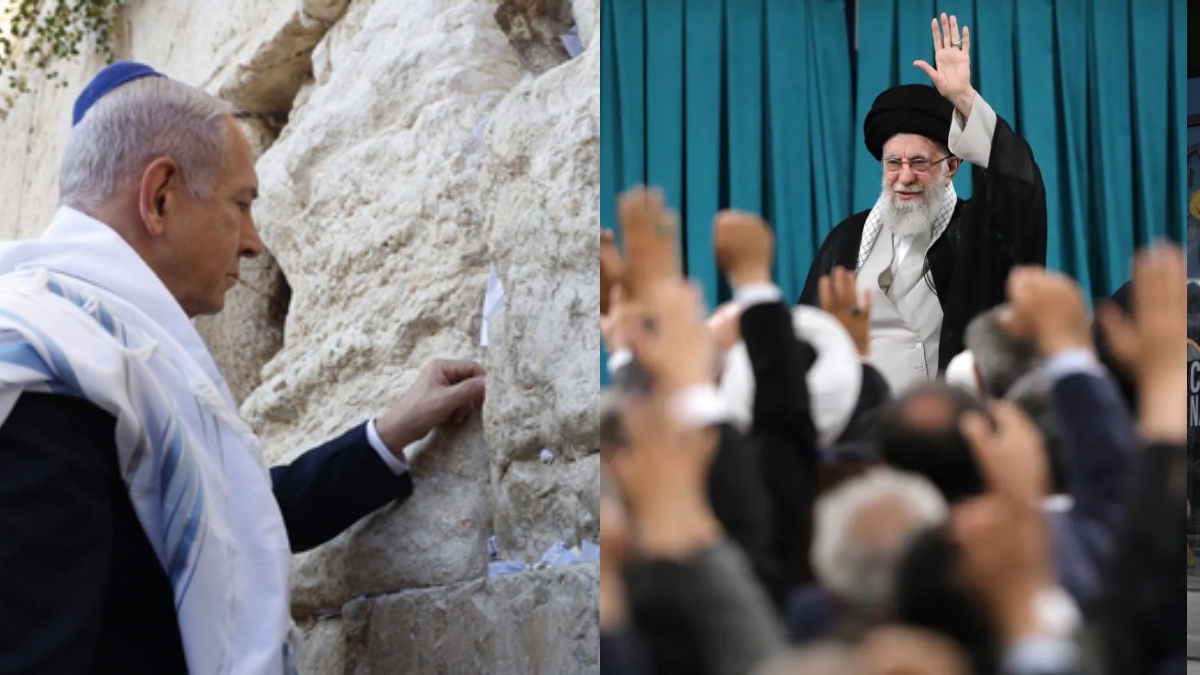West Asia continues to remain in a constant state of turmoil as Israel and Iran hurl missiles at each other. One common trend that has emerged from this conflict is how leaders of both sides are using history to justify their ongoing actions against each other.
While Israel’s Prime Minister Benjamin Netanyahu took the name of Operation Rising Lion against Iran from the Bible, Iran’s Supreme Leader Ayatollah Ali Khamenei evoked his religious symbol and traditions, pledging to retaliate against what he called the “Zionist regime”.
This is not the first time world leaders have used history and nationalistic sentiments to justify war or any form of conflict. The tactics have been used by the Russian President, Vladimir Putin, to justify his invasion of Ukraine, a war which has been raging on for the past three years. Here’s how both Netanyahu and Khamenei tapped into the commonly used playbook.
Netanyahu’s Operation Rising Lion
After Israel struck several top military and nuclear targets of Iran, the country’s Prime Minister Benjamin Netanyahu said that the strikes were conducted under Operation Rising Lion. Netanyahu noted that the name of the operation came from a biblical verse that promises a “victorious future for a powerful Israel.”
A day before the operation, Netanyahu was photographed putting a handwritten note into a crack of Jerusalem’s Western Wall, which is touted as the holiest prayer site of Judaism. On the day of the strike, his office released a photo of the note, which said, “The people shall rise up as a lion”.
It is pertinent to note that the expression comes from erse 23:24 of the Book of Numbers in the Bible: “Behold, the people shall rise up as a great lion, and lift himself as a young lion: he shall not lie down until he eat of the prey, and drink the blood of the slain.”
Impact Shorts
More ShortsThe verse is part of the first oracle of Balaam, a non-Israelite prophet and diviner, who foretells the strength and power of Israel. Balaam compared Israel to a lion that will not rest until it has satisfied its hunger.
Khamenei’s war cry
Meanwhile, Iran’s Supreme Leader, Ayatollah Ali Khamenei, took to X to declare “the battle” against Israel. “In the name of #Haider, the battle begins. Ali returns to #Khaybar with his Zulfiqar.” Khamenei wrote in Farsi, referring to Islam’s first imam, Ali, who won the Battle of Khaybar with the sword Zulfiqar.
What makes it relevant is the fact that Khaybar was a fortified Jewish stronghold in Arabia that Ali ibn Talib was known to have conquered during a crucial battle in Islamic history. This is not the first time Khamenei has used history to justify his current actions.
This very year, during nuclear deal talks with the US , Khamenei likened nuclear diplomacy—or temporary détente—to the 7th-century Treaty of Hasan ibn Ali with Muʿāwiyah. He called it a strategic “trial”, emphasising that it is a “temporary pause to safeguard long-term interests.
In the same year, hardliners called the current rounds of negotiations the Prophet’s Treaty of Hudaybiyyah (628 CE). The implication: moments of temporary peace can yield long-term strategic advantage. Apart from this, the Iranian supreme leader is known for his anti-Semitic remarks.
On several occasions, he questioned the certainty of the Holocaust—an argument aimed at undermining Western moral authority and reinforcing distrust of the West.
Old playbook
This is not the first time world leaders have been referencing history to justify bombing their adversaries. Throughout the ongoing Russia-Ukraine war, Russian President Vladimir Putin used history to justify the invasion of eastern Ukraine.
In an interview with far-right media figure Tucker Carlson, Putin gave a lecture on Russian history. In the 2-hour-long interview, the 71-year-old Russian leader spent more than 20 minutes showering a baffled Carlson with dates and names going back to the ninth century. After his rundown of history, Putin gave him a folder containing what he said were copies of historical documents proving his points that Ukrainians and Russians historically have always been one people, calling Ukraine’s sovereignty merely an illegitimate holdover from the Soviet era.
Commenting on the interview later, Carlson said he was “shocked” at being on the receiving end of the history lesson. Meanwhile, former US President, who often referred to Putin as his “friend” used, George W. Bush also used the same strategy during the Iraq war.
In June 2003, Bush told Palestinian officials that he felt “driven with a mission from God,” as he recalled the Iraq war. “God would tell me, ‘George, go … end the tyranny in Iraq.’ And I did," he said at that time. While the White House eventually said that Bush never made the claim, calling it “absurd,” multiple Palestinian officials confirmed that the former president made these remarks.
In 2002, Bush labelled Iraq part of the “axis of evil,” drawing on World War II parallels—a powerful historical framing that equated Iraq with ideological tyranny. Among religious conservatives, Iraq was even likened to ancient Babylon, reviving the Biblical motif of righteous conquest over an oppressive regime. Hence, both Netanyahu and Khamenei seemed to be using the old playbook.
)